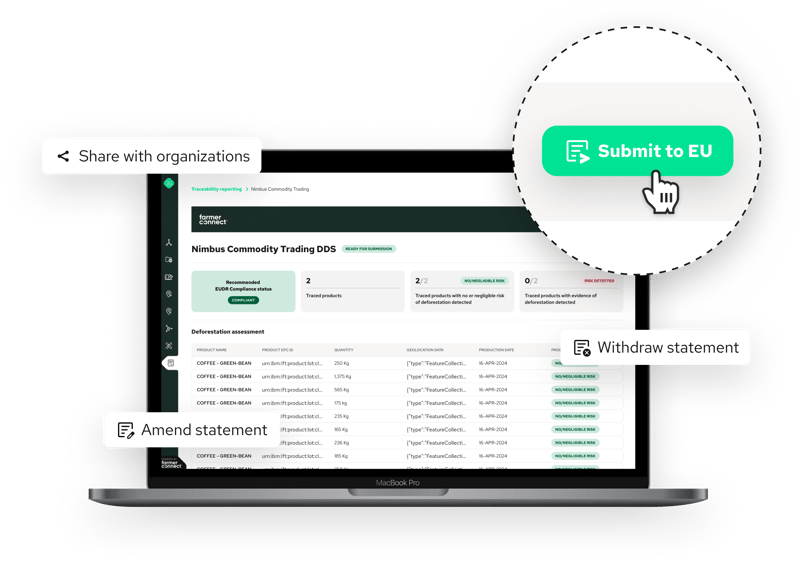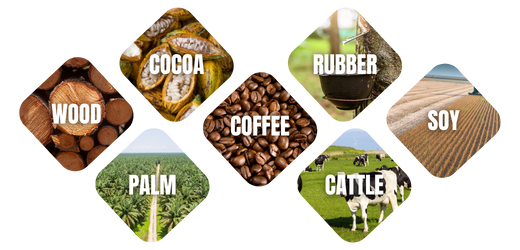In many of our discussions, one recurring question about the EU Deforestation Regulation (EUDR)...
The European Union's upcoming Deforestation Regulation (EUDR) represents a significant shift towards sustainable and transparent supply chains. It aims to combat deforestation and ensure that products imported into the EU are sourced responsibly. As businesses gear up for compliance, integrating with advanced traceability solutions can streamline operations and enhance transparency throughout the supply chain, whilst also ensuring compliancy ✅
Let's recap: What's the EUDR ?
The European Union Deforestation Regulation (EUDR) will establish strict measures to prevent companies from placing certain products on the EU that are linked to deforestation or forest degradation. It will also be illegal to export such products from the EU. The commodities currently impacted are wood, palm oil, cocoa, coffee, rubber, cattle and soy. However, one year into the regulation being in force, there will be a review to determine need and feasibility of expanding the scope to other commodities as well as ecosystems on the whole.
Operators and large traders will need to demonstrate origin, including geo coordinates in an auditable manner, to prove the product/commodity is deforestation free. This information will then need to be included in a Due Diligence Statement (DDS) that is submitted to Traces, an EU Due Diligence tool.
Companies will need to be compliant with the EUDR by December 2024.
So how do I ensure compliancy ahead of the December 2024 deadline?
Step 1: Evaluate Your Current Supply Chain Practices
In order to know what action needs to be taken to prove compliance, it's important to understand what your current supply chain looks like, from start to end. Who are the players, what are the current practices... By having this information at hand, the journey to compliance becomes easier to approach.
An important first step to compliance starts with understanding what is happening at source: what are the practices on ground and are there potential risks of deforestation linked to the product /commodity you aim to import into the EU. Moreover, when a transaction takes place, for example between a producer and cooperative, is this information documented in a trusted way or are we missing a system that enables this? These are all aspects that consider, not only from the perspective of the EUDR, but from the perspective of future regulations to follow, such as the Corporate Sustainability Due Diligence Directive (CSDDD), which aims to promote sustainability, protect human rights, and improve corporate accountability.
Another factor to think about is whether the product/commodity is traceable at batch/ lot level, whereby each individual batch is assigned a unique identifier and thus, can be linked to the exact geolocation of where it was produced. OR whether all plots of land used to produce the raw goods are grouped together. This second scenario means the operator will be declaring in excess, whereby, several plots are combined together vs declaring one geolocation per commodity/ product produced. We recently published an article on the risks associated with declaring in excess but in short, this means the operator takes full responsibility for the compliance of all the plots of land with provided geolocation and so, even if only some of the plots are used for production, the operator is still accountable for the compliance of every declared plot. And if any one of these plots is found non-compliant, this will mean ALL plots are non-compliant.
Step 2: Partner with a Traceability Solution Provider for Seamless Compliance
farmer connect offers a comprehensive traceability solution designed to meet the compliance requirements of the EUDR. And what's more, the benefits of our solution extend beyond compliance. This solution includes satellite-based deforestation assessments through our preferred partner Trade in Space, and goes beyond deforestation to also include various other ESG data points, addressing additional regulations such as the German Supply Chain Act.
Additionally, once the regulation steps into force, our clients will be able to submit their EUDR Due Diligence Statements to the EU's reporting system Traces via an API, directly from our platform.
Step 3: Map and Assess your Supply Chain with farmer connect
The key steps to mapping a supply chain starts with identifying all the different players that make up the value chain. This includes those involved in production, transportation and distribution, for example. All of this information is then documented, making sure that a trace connecting the product/commodity along the different stages exists.
As the EUDR requires a product/commodity being imported into EU to be traceable all the way down to exact geographic coordinates of where it was sourced, we need to ensure that the trace extends all the way to a specific geolocation. Our solutions enables our clients to demonstrate origin, including geo coordinates.
Digitalising this information allows for an auditable trace to be produced, which can then be exported and submitted, for example in the case of the EUDR as a Due Diligence Statement that includes the specific coordinates required to prove compliance.
Step 4: Report with farmer connect
Once your supply chain is mapped, you will get access to a dashboard where your supply chain data can be visually presented. Within this dashboard you will be able to explore risk areas and generate detailed reports for audit purposes. In the future this will also include direct submissions of the EUDR required Due Diligence Statement into the EU DD reporting tool, Traces. We are currently in the process of building this API integration. This will allow our clients to submit the Due Diligence Statement directly from their farmer connect dashboard, searchable by DDS#, Purchase Order Number or other reference such as Bill of Lading or ERP transaction number.
 You will be able to create and export traceability reports linked to specific lots or batches of your products. These will retrieve various data points, such as any certificates, farmers or other community members, geolocation data, and deforestation and other compliance assessments linked to the items specified in the report. You can also export a report of all your locations at origin, i.e. farms, plots or growing areas, and the results of any deforestation or other assessments at this location.
You will be able to create and export traceability reports linked to specific lots or batches of your products. These will retrieve various data points, such as any certificates, farmers or other community members, geolocation data, and deforestation and other compliance assessments linked to the items specified in the report. You can also export a report of all your locations at origin, i.e. farms, plots or growing areas, and the results of any deforestation or other assessments at this location.By following these steps, businesses can proactively prepare for the EU Deforestation Regulation while leveraging traceability solutions to enhance transparency, traceability, and sustainability across their supply chains. This approach not only ensures compliance with current and future regulatory requirements but also fosters consumer trust and supports responsible sourcing practices in the EU & Globally.

